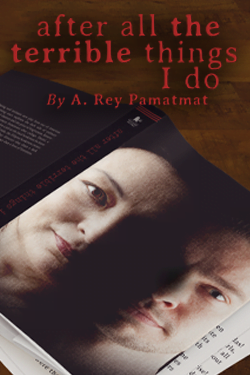after all the terrible things I do
By A. Rey Pamatmat
Directed by Andrew Volkoff
Produced by About Face Theatre
Playing in Theater Wit, Chicago
“For any big project, love is not enough. You need skill and experience. You need life to make it real.”
The rapid progress for gay people in the United States is a cause for pride and celebration, but has also left a lot of people whose stances “evolved” rather late in the game with reason to feel guilty about the recent past. If you saw Northlight’s production of Terrence McNally’s latest play, Mothers and Sons, you may notice a bit of a pattern with About Face Theatre’s Chicago premiere of A. Rey Pamatmat’s after all the terrible things I do. This two-person drama premiered in 2014 at Milwaukee Rep, and has been widely greeted as a promising sign for Pamatmat. Though the circumstances that inform the characters’ conversations are the sort that result from an author setting up a perfect premise, Pamatmat’s writing deftly and eloquently explores people grappling with things they regret, but can’t put right. To describe the specifics too much would allow readers to figure out things that are supposed to be discoveries, but you may rest assured that Andrew Volkoff’s production and his two outstanding actors tell a story that shows people at their ugliest and most vulnerable, and still treats them with great sensitivity.
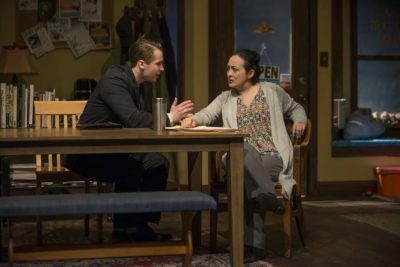
The play begins with a young man, Daniel (Colin Sphar), at a job interview with Linda (Lisa Tejero), the owner and founder of Books to the Sky. The small bookstore, meticulously designed by Chelsea M. Warren and supplied with props by Jenny Pinson, is cozy, intriguing, and obviously alluring to an aspiring novelist like Daniel. After finishing his degree in creative writing and briefly returning to Chicago, where he spent his teenage years, he has now returned to the unnamed small Midwestern town of his childhood, and wants a survival job in what was his favorite place growing up. With some prompting, Linda recognizes him as the little boy who used to visit her store often when it was new, and takes a liking to him. But, she advises, there are some things he can do to make life easier for himself. For example, grown men don’t have cowlicks. Also, he shouldn’t casually mention that he’s gay.
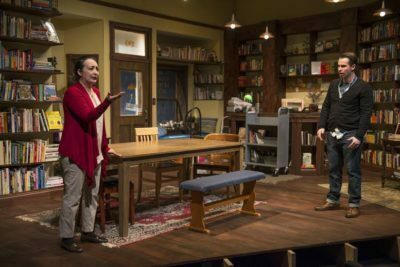
Daniel is incensed, and it takes a combination of pleading and commanding by Linda to calm him down. She’s older and from the Philippines, where transgender people are fairly normal but openly gay people are rare, and she often says the wrong things without meaning to. Daniel accepts that her intentions were good, and concedes that he’s oversensitive due to not being entirely sure how he fits into gay life (he describes himself as being “just another” overeducated, intellectually pretentious neurotic, but otherwise doesn’t live up to most stereotypes). She gives him the job, and over the months, Daniel and Linda become closer. He’s writing a book about two male lovers, one of whom bullied the other when they were boys and still occasionally feels murderous contempt for his weaker partner. Linda correctly intuits that it has autobiographical elements, and wants Daniel to teach her about his life. She had a son, she admits, who was gay, and killed himself after a lifetime of bullying during the years Daniel was in Chicago. This is obviously very fraught territory, and the two new friends try to navigate it as best they can. But the deeper into each other’s psyches they go, the more disturbed they are by what they find.
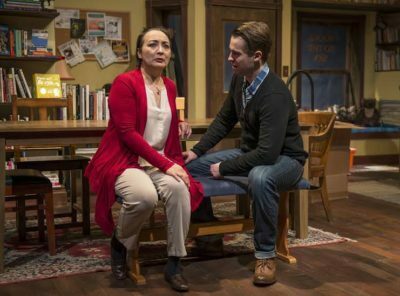
Obviously, this play depends on the performances of just two actors. Sphar and Tejero are both perfectly suited to their roles. Physically, Sphar is a good casting choice for a traditionally masculine gay man whose coming out was a surprise to everybody, and was spared the cruel treatment meted out to smaller, less assertive, and more feminine boys at school. Daniel’s love for the poems of Frank O’Hara and youthful combination of confidence and awkwardness blend appealingly with his Midwestern sturdiness. Tejero’s Linda is a fussy mother who prefers to have fun at work and be friends with her employees, but can become insistent and intimidating in an instant. She’s more outwardly nervous than Daniel, but has a greater awareness of how the world works. As we see them bond over their love for writing, their mentoring each other (with sometimes hilarious results), and their reliance on each other for therapy as well as work, we come to love them. And yet, the revelation of all the terrible things they’ve done seems completely in character for them, and is no less monstrous for all we’ve seen of their good sides.
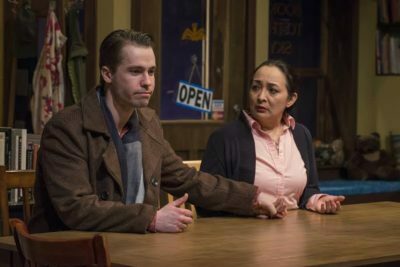
Even if the parallels Pamatmat has built into his characters’ stories are a little too neat, they are prime grounds for psychological investigation. The themes of responsibility, forgiveness, and revenge are woven into the dialogue naturally, so that there are hints of where they are leading, but the results are no less powerful. Volkoff’s directing allowed the actors to fully bring out the messiness of their characters, so that the damage they’ve inflicted on themselves is as tragic as what they’ve done to others. An LGBT-themed company must find high-quality new work very rapidly to stay relevant, and About Face has done that with their current selection. Even with better-informed parents, greater efforts by schools to combat bullying, and more self-awareness among gay youth, the sort of confusion on multiple fronts which Daniel and Linda wrestle with is still prevalent, and the kind that people are often still afraid to discuss openly. After all the terrible things I do provides an opportunity to acknowledge dark secrets and regrets many people share, and is a highly rewarding drama.
Highly Recommended
Jacob Davis
[email protected]
Reviewed March 17, 2016
This show has been Jeff recommended.
For more information, see after all the terrible things I do’s page on Theatre in Chicago.
Playing in Theater Wit, 1229 W Belmont Ave, Chicago. Tickets are $35, with discounts for students, seniors, and groups. To order, call 773-975-8150 or visit aboutfacetheatre.org. Performances are Thursdays and Fridays at 7:30 pm, Saturdays at 3:00 pm and 7:30 pm, and Sundays at 3:00 pm through April 10. Running time is one hour and forty minutes with no intermission.

